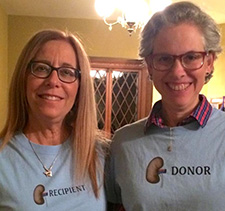
Photo by Rachel Kaplan
Following a kidney transplant last summer, Dr. Faith Krausman resumed practicing veterinary medicine with no problem. Overall, she says, “Things were just like before,” except she feels better than before.
As a veteran veterinarian, I have been highly aware of potentially hazardous substances in the workplace. I was the one who gowned and gloved before coming close to any chemotherapy agent I was using on a dog. It was I who inquired about ethylene oxide and learned it is a dangerous sterilizing agent that should be handled with care. At one hospital where I worked, I would not drink from the tap, as the town was nicknamed Cancer Alley by residents suspicious of the drinking water.
In short, when it came to occupational hazards, I was the Wonder Woman of Workplace Worries. So, after I underwent a kidney transplant, you might think that I would not want to return to such an environment. After all, organ recipients have to take immunosuppressant drugs, making them fragile in so many ways, right? That’s the common belief, at least. But it turns out that many common beliefs about receiving and donating organs are myths.
First, a little background:
My kidney problem was a genetic disease that does not usually express itself until after age 30. The kidneys became filled with cysts that originated from the distal tubules. The cysts would then occlude the nephrons from functioning, leading to eventual failure of the kidneys. The cysts acted like a kind of bubble wrap, in other words, that pushed away the normal kidney tissue until it could not filter urine properly. As the condition worsened, I grew tired, anemic and just felt crappy most of the time. But I put up a good front, and even went on a bike tour in New York City less than one month before my transplant, with less than 8 percent of renal function.
The bike tour was with my book group. And my book group is where I met my donor, Judy Summers. She heard I needed a kidney and stepped up. We were a good match, and the surgery last July was a success. We both healed quickly. I was a model patient, taking my blood pressure, weight and temperature twice a day, taking all of my medication, washing the outside of an orange before eating it and even writing down my daily urine output.
I had to take off work for three months because of what I do for a living. If I had a desk job, I could have gone back after two months. The aim of the doctors was to delay the return to work until my immune system was not so suppressed. Anti-rejection drugs are started at high doses but reduced over time, so transplant recipients do regain some natural immunity.
Once I returned to work, things were just like before. I examined, diagnosed and treated patients, did work-ups, and generally performed my veterinary duties on a daily basis to the best of my ability. In addition to working in a clinic, I have a house-call practice, and I did the same there. The patients and their owners were happy to see me back, and the hospital staff was also very welcoming. I felt good, better than before, ready to greet each day with a smile.
The precautions I take are minimal, less than a person who is a germaphobe. I just use common sense. I will not kiss you if you are coughing or if you have a stomach bug. But I will hug you if you are not showing these signs and you need a hug.
Some of you may have heard or believe that an organ recipient is in for a long and difficult recovery and cannot work in veterinary medicine handling animals. These are myths. A renal transplant leads to a better quality of life than one might imagine. It is certainly better than being on dialysis. I don’t know where these myths come from, but my post-transplant nephrologist laughed when I questioned if I had to delay or discontinue my work. He told me that was silly, that I was fine to go back to work. Prior to my transplant, I also met with an infectious disease specialist, who only cautioned me to wear protective gear when handling reptiles due to the risk of Salmonella.

Photo by Lissa Parsonnet
Krausman and the woman who became her kidney donor, Judy Summers (right), met in a book group.
I try to take the necessary precautions at work when dealing with exotic patients or any staff member who’s sick with a cold, and I try to take the necessary precautions at home by not cleaning the pond or litter boxes, relegating those tasks to my lovely husband. I had to re-home my rabbit, dove and lizard — the rabbit because rabbits carry certain diseases that could be easily spread to me and be hard to diagnose; the lizard because reptiles carry Salmonella; and the dove because doves and other members of the pigeon family are known to harbor many infectious agents. But I can work on these species as long as I wear gloves and a mask.
Nothing is further from the truth than the statement that a person cannot work as a veterinarian or a veterinary technician or as any other veterinary staff member after getting a renal transplant. The reason you are getting it is so that you can work in the field you have chosen, to regain your sense of normalcy. My doctor said his goal is to get people healthy again and back to work. This is not a case for permanent disability. Rather, this is a case for ability, the ability to do your job better than ever, and to regain your zest for living.
To the donors out there: Please do not be worried about your recovery. The hospital stay can be as short as two days, and you can get back to work in most cases in four to six weeks. Give someone a kidney, and give them a life. Remember, you need only one.
To recipients: Don’t stop working. Just take the time you need to recover, take your medication and use common sense. Don’t stay extra-long with an emergency if you feel your energy fading. The other doctors will have your back.
If you’re a solo practitioner, tailor your schedule to your needs. Don't overbook; don't work 12 hours straight unless you think you can handle it. Don't put your health at risk to see one more client. There are other vets in your town who can do this for you. Your client will understand. You need to put yourself and your new kidney first.
I feel lucky to have had this experience, as it not only gave me my life back but showed me the generosity of another human being and the goodness in people. I am very grateful to my donor, my surgeon, my doctor, my nurses, my family and my friends. Their support was instrumental in my recovery. After going through this experience, how can I be anything but grateful for each day I have left on this earth? And if any of you out there would like to consider donating a kidney, my sister needs one!
Dr. Krausman is a graduate of the Cornell University College of Veterinary Medicine. She has been a member of the Veterinary Information Network since its founding in 1991. She enjoys working on small animals and exotics, including pocket pets, reptiles and birds. She is the owner of Vet on Wheels, a house-call practice, and maintains a part-time relationship with the Maywood Veterinary Clinic, where she has worked for more than 20 years. In her spare time, she is an avid saxophone player, involved in jazz bands, sax quartets and other avenues of music. One way she counteracts stress in her life is through Iyengar yoga, which she has resumed after a hiatus following transplant surgery.